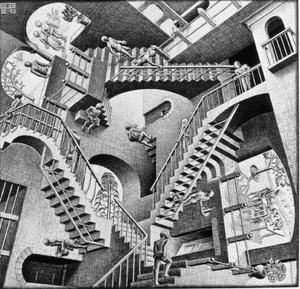My doctrine prof, Dr Peter Schmiechen wrote a great letter to me when my daughter was born. Dr Schmiechen is a genius theologian as well as a kind and gentle soul. he is an artisan who works with wood and i have a small Iona community cross that he made that i pray with often. anyway.. here is what he wrote as reference for those out there who are trying hard to understand where i'm coming from. it's also written as a reminder of who i'm percieved to be as i attempt to put on paper my fluid theology.
(this was written to my daughter just days after her birth, he dropped off slippers his wife knitted. the book came in May, after the Doctrine class was over.)
Dear Eve,
We met when you were but a few days old: sleeping calmly under the watchful eyes of your parents. Perhaps I will come to know you better but for now I wish to speak of your father. He is a good man. His life is made of many conflicting experiences, held in tension, waiting to be resolved. Some of that resolution appears to be taking place.
His family life was divided, his religious experience fractured several times, his interests were and still are quite varied. As you will discover, he is very bright and good with words, able to fire the imagination. He says he does not like duality or division, but he is constantly thinking in terms of either/or. He claims the inclusive tradition of medieval theology, where everything finds its proper place in an ordered universe, but he thinks about things more in terms of storm and stress, with bold images tied to tradition only by thin lines. But those lines make all the difference in the world.
He wants a church set free from dogma, absolutism, moralism, and arrogance, free to proclaim Christ the word of grace. He makes it sound like he is starting all over again but then drops hints of incarnation, cross, resurrection and real presence. He likes writers who ridicule abstract theories because Christ is a real word of grace, but leaves us wondering how this grace actually appears. The record shows it has be co-opted, controlled, abused and misused by nearly everyone, and that it would be helpful (Paul's helpful) to have some guidelines, but not a Sears' Manuel. At times he sounds like those who want to get back to the simples teachings of Jesus (which few have actually agreed on), only to surprise us that he really does think, believe and experience the mystery of grace incarnate in person and presence. He likes to set things at odds and in tension, but then the day is saved by simple affirmations of grace.
Maybe experience does triumph over dogma, tensions softened by love, old conflicts resolved by grace. Without knowing it, you were born into all of this: the child of your parents named for the mother of us all. Your father once recoiled at the thought of that mysterious story of Adam and Eve, but it appears he has mellowed, no doubt through the influence of your mother and now you.
It is fitting that he should be in the process of finding a faith home at the moment he and your mother are creating a home for you. So begins a process of mutual care among the three of you, an image of a larger grace.
Talk about a once in a life time letter... because Peter is a once in a lifetime guy. Check out his books on amazon: like Saving Power and esp. Christ the Reconciler: A Theology of Opposites, Differences, and Enemies which this letter came with. If you want to understand where i'm coming from.. if i do as well... this book is part of it. always looking for the third way.. the transcendent way.. not really always compromising.. sometimes this way pisses everyone off.. sometimes this way gets you killed.
hope this letter was some light.. as it was for me. peace!




